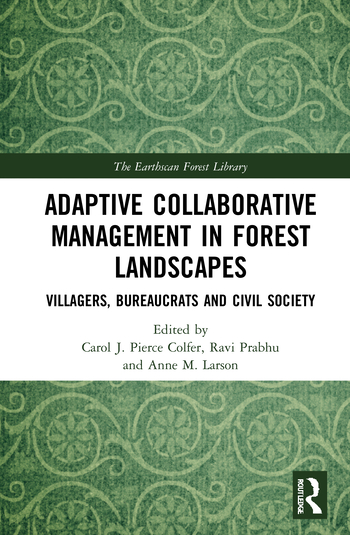An account is required to join the Society, renew annual memberships online, register for the Annual Meeting, and access the journals Practicing Anthropology and Human Organization
- Hello Guest!|Log In | Register
Adaptive Collaborative Management of Forest Landscapes
 New book: Adaptive Collaborative Management of Forest Landscapes: Villagers, Bureaucrats and Civil Society edited by Carol J. Pierce Colfer, Ravi Prabhu, and Anne M. Larson (2021 London: Earthscan Press)
New book: Adaptive Collaborative Management of Forest Landscapes: Villagers, Bureaucrats and Civil Society edited by Carol J. Pierce Colfer, Ravi Prabhu, and Anne M. Larson (2021 London: Earthscan Press)
It came out in mid-December and Colfer has yet to see a hard copy! But the good news is that it is freely available open access, on line at https://www.routledge.com/Adaptive-Collaborative-Management-in-Forest-Landscapes-Villagers-Bureaucrats/Colfer-Prabhu-Larson/p/book/9781032053677. You can ignore the hefty price for the print copy.
The book came about when Carol Colfer, an SFAA member, began wondering in May 2020 if the roughly 90 partners who had participated in a global program at CIFOR (Center for International Forestry Research) in the late 1990s and early 2000s, might have continued to use any of the ideas we’d developed in the Adaptive Collaborative Management of Forests Program she led for its first four years. The approach builds on local conditions, responds to local concerns in the hands of local people, emphasizes learning and overcoming obstacles that arise or changing course as needed. It’s designed as an empowering approach. Colfer was very attached to these premises, optimistic about their possibilities – but also curious about how things had evolved. She thought the approach was likely even more relevant now than at the time it began and hoped these partners might have some lessons to teach the rest of us about what had worked and what had not. She had no budget to offer, so she imagined it might be a hard sell.
She was really surprised and pleased when, by July she’d received 22 abstracts for papers these folks wanted to write about their experience! After a year and a half of hard work on this book, it is now done and available.
This book, the first of two, begins with a ‘conversation’ among the three co-editors (all of whom had had leadership positions in ACM, two in the first phase, one in a second) about the conceptual underpinnings of the approach. Why was it needed and what made us think it would work? There are chapters on transdisciplinary collaboration, on how ACM projects in Latin America struck the village participants, on what was accomplished (and what was not) in one particular program in Uganda that focused on women’s participation in restoration. The book offers tools for dealing with situations marked by inequitable power among the participants – so common in tropical forests -- and a theoretical treatise on how power works in groups and how to deal with it. One chapter examines uses of one element of ACM, participatory action research, outside the world of tropical forestry (where ACM was conceived).
ACM began as a bottom-up, very local participatory approach that built on anthropological understandings. Now, there is a push to upscale the approach, to use it on a broader scale. The concluding chapter discusses this issue and examines two present-day programs in Africa that are trying to do just that.
The editors and publisher are also proud of the strong role of developing country researchers – of both sexes -- as lead authors in this collection. So often, the contributions of folks from the countries studied are sidelined, with those from developed countries taking the lead.
Two talks will discuss this book, one by Carol, from 4-5 PM on February 3rd at Cornell, part of the ‘Chats in the Stacks’ series. This is the zoom link to register:
https://cornell.zoom.us/webinar/register/WN_3OlEUgifTByxWd_WOZyyVg .
On February 11th, at 8:30-9:30 AM Ithaca time, a webinar on the book will feature Carol, Ravi Prabhu and Anne Larson, her two co-editors: You can register for this one in advance at
https://ubc.zoom.us/meeting/register/u50kf-6orDIoH9AIGngMcgwoUEXPqdQn6l-r.
Carol is working now with another set of authors on a second book, tentatively titled Adapting to Common Cause: Community Wellbeing, Forests and Sustainable Futures. They hope to publish this one later this year.
Carol J. Pierce Colfer, PhD, MPH
Visiting Scholar, Southeast Asia Program, Cornell University
Senior Associate, Center for International Forestry Research
Address: 21 Etna Lane, PO Box 280, Etna, NY 13062-0280, USA
Emails: cjpcolfer@gmail.com; c.colfer@cgiar.org; cjp59@cornell.edu
Phone: cell: 1-607-379-9977; home 1-607-291-4058

Cart
Search